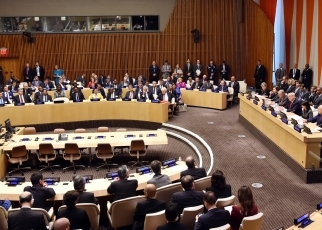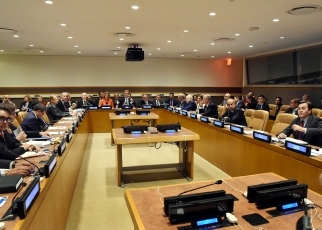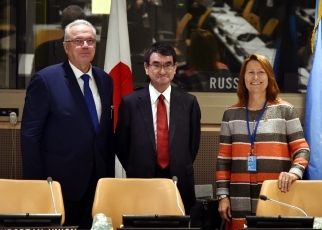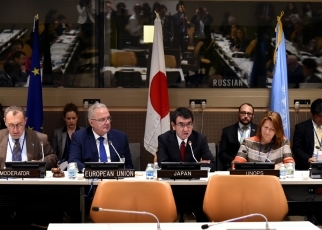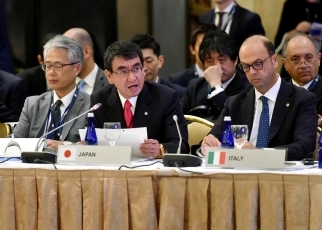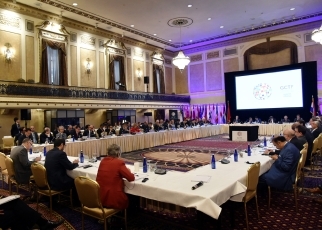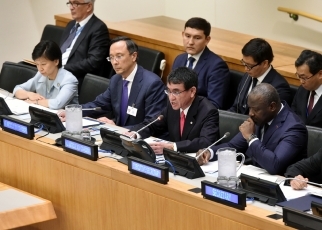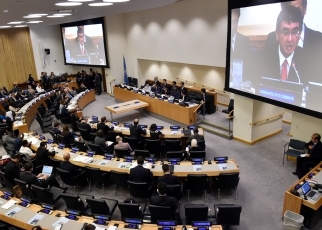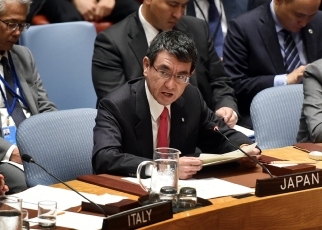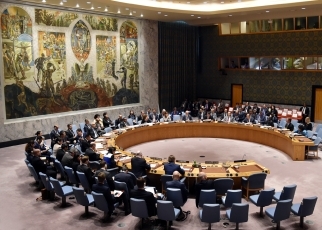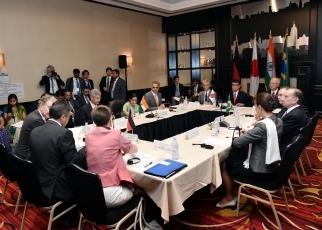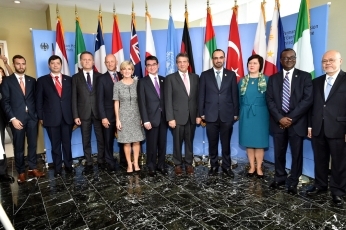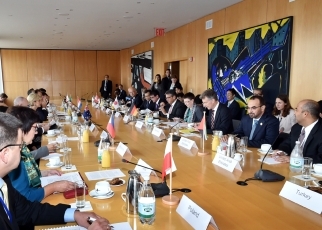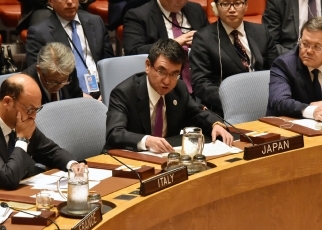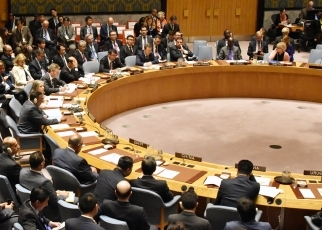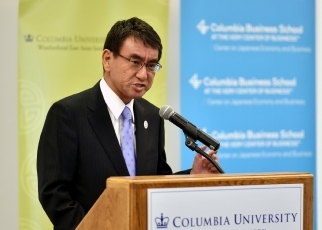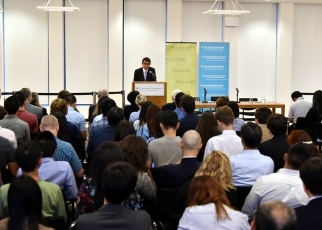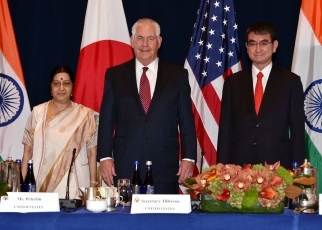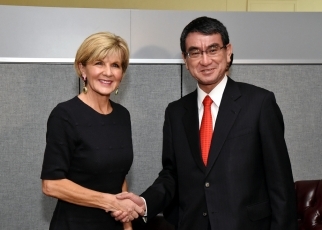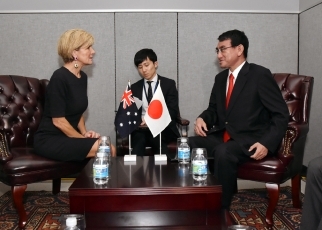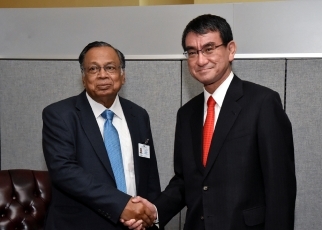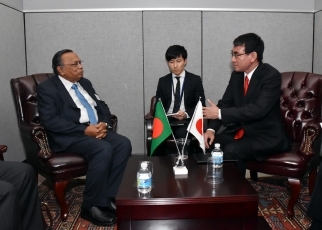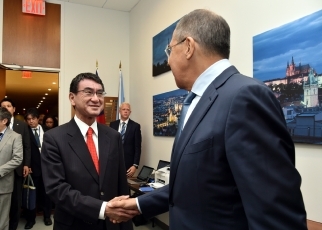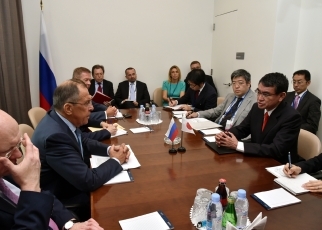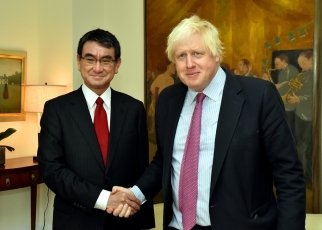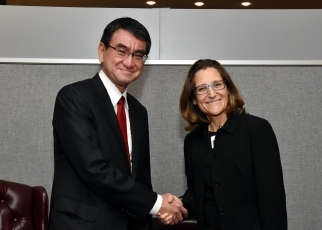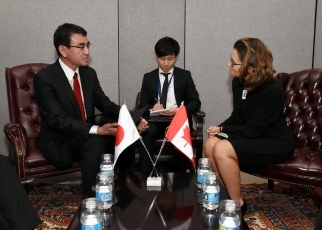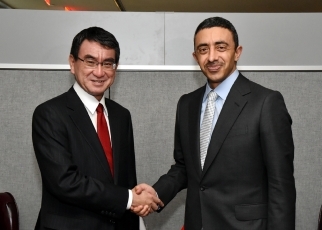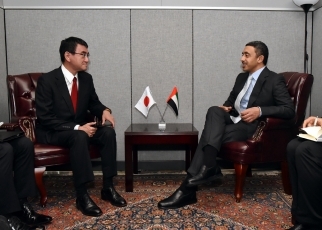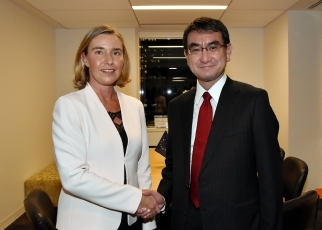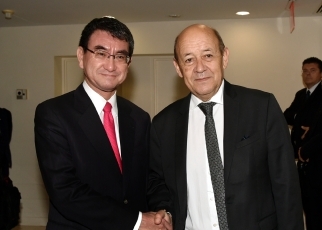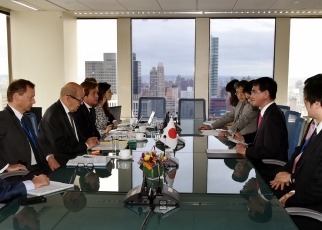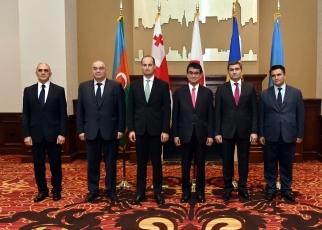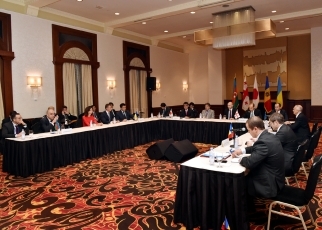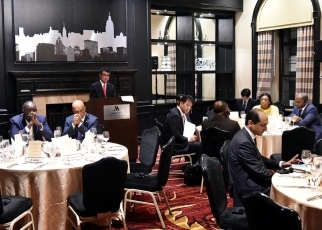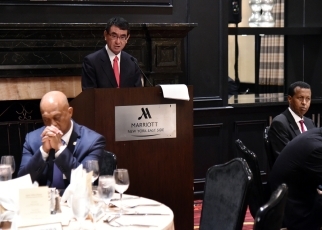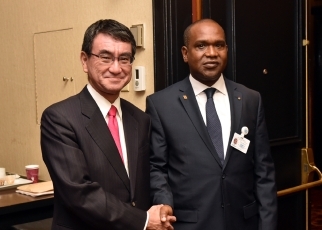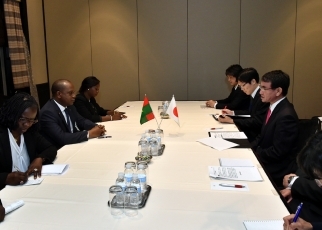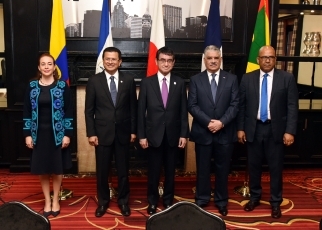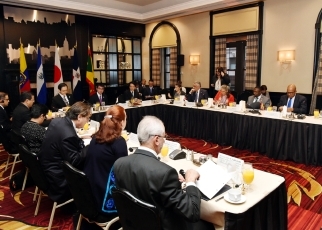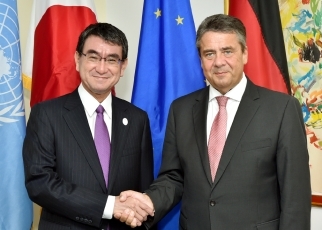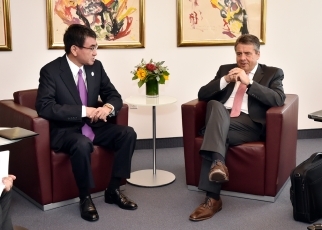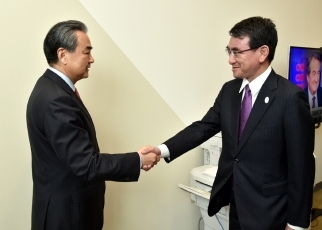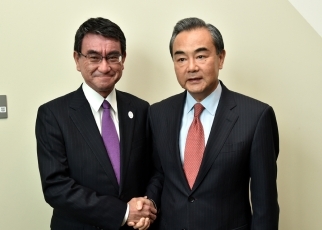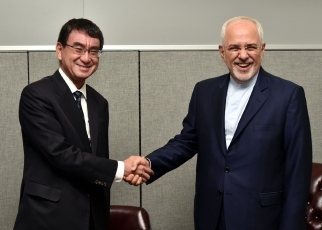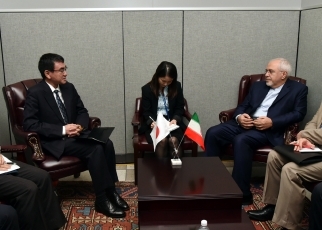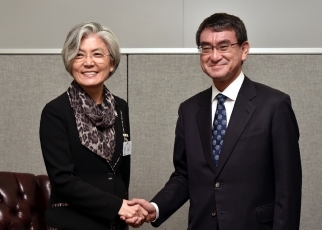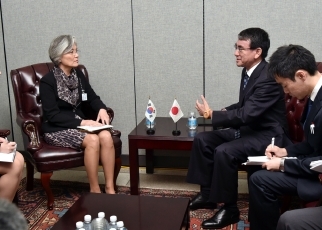Japan and the United Nations
Minister Kono Attends the 72nd Session of the United Nations General Assembly
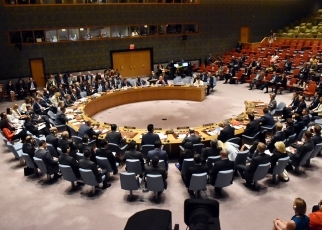

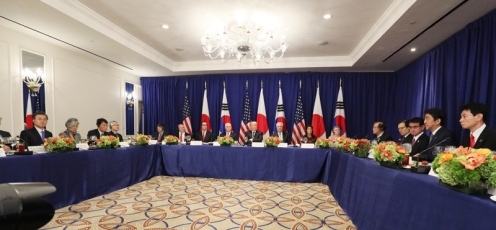 (Photo: Cabinet Public Relations Office)
(Photo: Cabinet Public Relations Office)
- Mr. Taro Kono, Minister for Foreign Affairs, visited New York from Sunday, September 17 to Friday, September 22 to attend the 72nd Session of the United Nations (UN) General Assembly.
- Minister Kono enhanced relations with many countries and regions through his participation in the multilateral and bilateral meetings below, and actively presented Japan’s position and its contributions regarding challenges the international community faces. Minister Kono also gave a speech at Columbia University entitled “Diplomacy in Creeping Crises”.
- In particular, as North Korea conducted its sixth nuclear test and launched ballistic missiles that flew over Japan twice during the last three weeks, he emphasized the need for the international community to apply an unprecedented and new level of pressure on North Korea to make it change its policy by working in solidarity with the international community against the threat posed by North Korea and by fully implementing the relevant UN Security Council (UNSC) resolutions.
1. Actively presenting information on Japanese positions and contributions regarding international issues
(1) Exchange of views with Japanese staffs in UN organizations (September 17)
Minister Kono expressed his intention to exert his utmost effort to support Japanese staff at UN organizations, explained that the Government of Japan has created a strategy to increase the number of Japanese staff and has been taking various initiatives to that end, and expressed his hope that the number of Japanese seeking to join international organizations will increase. He also exchanged views with the participating Japanese staffs, including on issues that the Government of Japan should address to increase the number of Japanese staff.
(2) Breakfast hosted by Mr. Gary Cohn, Director of the National Economic Council (NEC) of the United States (September 18)
Minister Kono expressed his hope that the United States will participate more actively in energy and climate change issues, and stated that Japan will vigorously tackle this important issue of climate change under the Paris Agreement and that it is important to strengthen global energy security. Participants exchanged views on the importance of promoting global climate change policy and strengthening energy security.
(3) High-level event on UN reform (September 18)
President Trump expressed his support for the efforts to advance UN reform led by Secretary-General Guterres, and called on other Member States to support the Secretary-General’s efforts, in order to produce results that are in line with the massive investment it gains from its Member States. Secretary-General Guterres also expressed his determination to advance management reform in order to enhance simplification of procedures, decentralization, transparency, efficiency, and accountability of the UN.
(4) Ministerial Meeting of the Ad Hoc Liaison Committee (AHLC) on Palestine (September 18)
Minister Kono expressed concern over the fact that there has been no progress in the Middle East Peace Process and explained that the Government of Japan has decided to provide approximately USD 20 million including new projects to support Palestine. Many participants expressed concern over the humanitarian situation in Gaza and the stalling of the Middle East Peace Process, and reaffirmed the need to support the economic and social stability of Palestine as a whole, towards a two-state solution.
(5) High-Level Side Event on Promoting Quality Infrastructure Investment (September 19)
In his keynote speech as a co-host of the event, Minister Kono introduced Japan’s efforts in promoting quality infrastructure such as the “Expanded Partnership for Quality Infrastructure” and the “Free and Open Indo-Pacific Strategy” and emphasized the importance of standardizing the concept of “quality infrastructure” internationally and building international rules that help mobilize private finance which is indispensable to increase capital for infrastructure investments. Through this event, the importance of internationally promoting “quality infrastructure” was widely shared.
(6) Global Counterterrorism Forum (GCTF) Ministerial Plenary Meeting (September 20)
In his speech, Minister Kono commented on the current situation in which the threat of terrorism is spreading quickly across Europe and Asia, and introduced Japan’s international cooperation to combat global terrorism and its unique assistance for measures against violent extremism, and announced Japan’s plans to further strengthen international cooperation to combat global terrorism by contributing to the activities of GCTF and signing the UN Convention against Transnational Organized Crime (UNTOC). A ministerial statement and two outcome documents were adopted.
(7) Conference on Facilitating the Entry into Force of the Comprehensive Nuclear-Test-Ban Treaty (CTBT) (September 20)
In his speech, Minister Kono introduced the lessons Japan learned through its efforts as co-coordinator of the Conference on Facilitating the Entry into Force of CTBT and expressed Japan’s determination to lead the efforts of the international community towards the early entry into force of CTBT. Several countries condemned the nuclear tests by North Korea in their speeches and made references to the need for the early entry into force of CTBT in their speeches. A final declaration was adopted as an expression of the collective will of all participants of the conference. This included condemnation of North Korea’s nuclear tests in the strongest terms.
(8) Security Council High-Level Open Debate on Peacekeeping Operations Regarding the Reform of UN Peacekeeping (September 20)
In his statement, Minister Kono pointed out the importance of enhancing the capabilities and performance of PKO personnel and introduced best practices from Japan’s training and capacity building support such as the UN Project for Africa Rapid Deployment of Engineering Capabilities (ARDEC). Various countries emphasized the need for conflict prevention and political solutions, as well as the importance of partnerships between the UN and regional organizations. UNSC resolution 2378 (2017) on UN Peacekeeping Reform was adopted as an outcome of the Open Debate.
(9) Meeting of the Foreign Ministers of the G4 countries on UN Reform (September 20)
The G4 Foreign Ministers reconfirmed the need for an early reform of the Security Council in a manner that includes the expansion of both permanent and non-permanent categories of membership and the improvement of working methods in order to make the Council more legitimate, effective and representative. They also expressed their determination to launch text-based negotiations at the Intergovernmental Negotiations during the 72nd session of the UN General Assembly, based on the recognition that all aspects of reform had been thoroughly discussed by the end of the 71st session of the General Assembly, taking into account the fact that the overwhelming majority of Member States support the initiation of text-based negotiations,.
(10) Ministerial Meeting of the Non-Proliferation and Disarmament Initiative (NPDI) (September 21)
As Co-chair, Minister Kono stated that the role of NPDI is important more than ever, given the increasingly severe environment for promoting nuclear disarmament. Minister Kono expressed his intention to cooperate closely with each country in order to rebuild trust between nuclear weapon states and non-nuclear weapon states, and strongly condemned North Korea’s nuclear tests, missile launches, and other provocations. At the Joint Press Conference of the meeting, 1) a joint statement by the NPDI foreign ministers to reiterate their potential resolve to contribute to a successful conclusion of the 2020 NPT Review Conference through realistic and practical proposals and 2) a separate joint statement condemning North Korea’s provocations in the strongest terms were issued.
(11) UNSC Ministerial Meeting On the Proliferation of Weapons of Mass Destruction (September 21)
Minister Kono stated that Japan is deeply concerned by the serious challenges the international non-proliferation regime faces and noted the importance of concrete efforts such as CTBT. He strongly condemned North Korea’s nuclear weapons and missiles, and urged it to strictly and fully implement the UNSC resolutions. Many countries commented on the importance of maintaining and strengthening the disarmament and non-proliferation regime, including the NPT regime and UNSC Resolution 1540, as well as the role that the UNSC plays in the non-proliferation of weapons of mass destruction, and strongly condemned the series of nuclear tests and ballistic missile launches by North Korea.
(12) Speech at Columbia Universityptember 21)
Minister Kono gave a speech at Columbia University entitled “Diplomacy in Creeping Crises.”
(13) High-Level Meeting on the Humanitarian Situation in Yemen (September 22)
Minister Kono expressed concern over the extremely serious humanitarian situation in Yemen and explained that Japan has been steadily implementing the support Japan announced at the Yemen Pledging Conference in April. Moreover, while calling on the Government of Yemen to take positive action towards a cessation of hostilities, Minister Kono called on relevant countries to encourage all parties in Yemen to move towards dialogue.
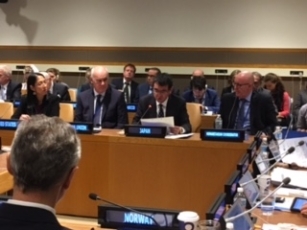 握手を交わす両首脳
握手を交わす両首脳
(写真提供:内閣広報室)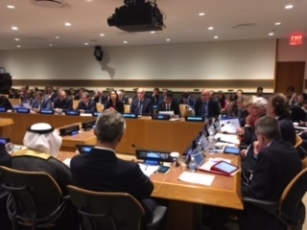 日・ウクライナ首脳会談
日・ウクライナ首脳会談
(写真提供:内閣広報室)
2. Strengthening relationships with various countries and regions through meetings and conferences
(1) Japan-U.S.-India Foreign Ministers’ Meetingptember 18)
The Foreign Ministers of Japan, the United States and India shared their views that the international community, including the three countries, should jointly apply an unprecedented, new level of pressure on North Korea. They also agreed to strengthen cooperation in maritime security as well as to enhance regional connectivity, and to strengthen and maintain the dialogue between the three countries going forward, towards the realization of a free and open India and Pacific Ocean.
(2) Japan-Australia Foreign Ministers’ Meeting (September 18)
Both ministers shared their views of further strengthening the “Special Strategic Partnership” between Japan and Australia and coordinating closely in order to maintain a free and open international order based on the rule of law. Both ministers reaffirmed to coordinate closely towards an early conclusion of the Trans-Pacific Partnership (TPP). The two ministers also shared their requisition to coordinate closely on the issue of North Korea and cooperate in addressing human rights issues of North Korea including the abductions issue.
(3) Japan-Bangladesh Foreign Ministers’ Meeting (September 18)
Minister Kono explained that the Government of Japan is considering specific measures to assist refugees that are flowing into Bangladesh and that it will call on the Government of Myanmar to restore the situation of security. With regard to the situation in North Korea, Minister Kono explained the necessity of applying an unprecedented, new level of pressure on North Korea to urge it to change its policy, and requested cooperation to that end.
(4) Japan-Russia Foreign Ministerial Meeting (September 18)
Minister Kono strongly urged Russia to exercise influence over North Korea, and the two ministers shared the view that Japan and Russia will work together on the issue of North Korea at various levels and occasions including the UN Security Council. Regarding the Northern Territories issue, the two ministers confirmed that they will materialize the agreements at the Japan-Russia Summit Meeting on the occasion of the Eastern Economic Forum in Vladivostok.
(5) Japan-U.K. Foreign Ministers’ Meeting (September 19)
(6) Japan-Canada Foreign Ministers’ Meeting (September 19)
(7) Japan-United Arab Emirates (UAE) Foreign Ministers’ Meeting (September 19)
(8) Japan-EU Foreign Ministers’ Meeting (September 19)
(9) Japan-France Foreign Ministers’ Meeting (September 20)
(10) Japan-Brazil Foreign Ministers’ Meeting (September 20)
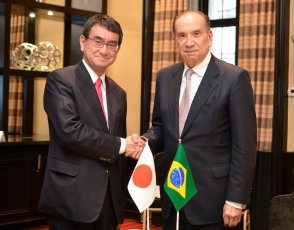 (Photo: Ministry of Foreign Affairs of Brazil
(Photo: Ministry of Foreign Affairs of Brazil


